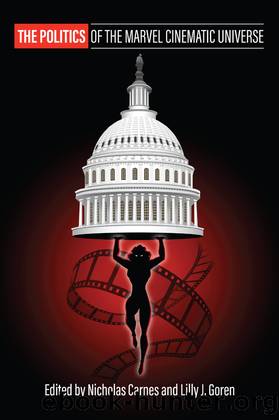The Politics of the Marvel Cinematic Universe by Lilly J. Goren;Nicholas Carnes;

Author:Lilly J. Goren;Nicholas Carnes; [Nicholas Carnes && Lilly J. Goren]
Language: eng
Format: epub
Publisher: Lightning Source Inc. (Tier 1)
Published: 2022-10-30T00:00:00+00:00
CHAPTER 15 FROM âGRRRL POWERâ TO âSHEâS GOT HELPâ
Captain Marvel as the Superhero of Second-Wave Feminism
Kristin Kanthak
When Captain Marvel crash-lands into a Blockbuster Video on Earth in 1995, the Avengers are not yet even a twinkle in Nick Furyâs eye. A preteen Natasha Romanoff is still in Russia, training to be a KGB assassin. Captain America will be on ice for another fifteen years. Spider-Man isnât even born yet, and party boy Tony Stark is likely off somewhere drunkenly stumbling into the wrong house (Associated Press 1996).
In the real world, at the same time, the feminist movement was at something of a crossroads. âThe feminist movementâ has never been just one thing, either in the United States or globally. Rather, the term has come in and out of vogue since its inception in the United States in the 1910s (Cott 1987) and has held various meanings since that time, often concurrently carrying several different meanings for different people (Schuller 2021). Most important to our current discussion, one of the main areas of disagreement has been around how to address the fact that most women are physically and culturally weaker than most men. Too little focus means a feminism that ignores the very real power differentials that affect womenâs lives. Too much focus means a feminism that paints women solely as victims, a portrait that is as unrealistic as it is depressing.
It is telling, then, that Captain Marvel drops into that Blockbuster Video at a time when this discussion has reached an apex, with writers such as Naomi Wolf and Katie Roiphe distinguishing themselves from what they considered the âvictim feminismâ of earlier second-wave feminists such as Catharine MacKinnon, Germaine Greer, and Betty Friedan. Indeed, it was a debate that moved from college campuses to pop culture, with, for example, Christina Hoff Sommers fretting over who âstoleâ feminism in a New York Times best seller and even the Spice Girls about to climb the charts with a co-opted version of Riot Grrrl Kathleen Hannaâs âGirl Powerâ concept for their own bubblegummy brand of female empowerment. Although Captain Marvel herself does not take a position on 1990s-era feminist clashes, the film provides a fresh take on them, both repudiating the shortsighted âpower feminismâ of the 1980s and 1990s and providing a lens through which to better understand the contributions made by second-wave feminists to our understanding of how our societal rulesâmost notably our conception of powerâare tied into our understanding of how gender operates.
In this chapter, I argue that the Captain Marvel character demonstrates how second-wave feminist concepts might be resurrected for pop cultural consumption and that doing so might benefit society in general. Rather than thinking about Captain Marvel as a flawed power feminist, we may think of her as actively renouncing power feminism and instead standing as a conduit through which to understand some of the more complex concepts that second-wave feminism was trying to get across. (For another take on Captain Marvel that situates the film in the larger MCU gender narrative, see Beailâs chapter in this volume.
Download
This site does not store any files on its server. We only index and link to content provided by other sites. Please contact the content providers to delete copyright contents if any and email us, we'll remove relevant links or contents immediately.
The Secret History by Donna Tartt(18090)
The Social Justice Warrior Handbook by Lisa De Pasquale(11944)
Thirteen Reasons Why by Jay Asher(8420)
This Is How You Lose Her by Junot Diaz(6412)
Weapons of Math Destruction by Cathy O'Neil(5803)
Zero to One by Peter Thiel(5464)
Beartown by Fredrik Backman(5312)
The Myth of the Strong Leader by Archie Brown(5219)
The Fire Next Time by James Baldwin(4998)
How Democracies Die by Steven Levitsky & Daniel Ziblatt(4943)
Promise Me, Dad by Joe Biden(4900)
Stone's Rules by Roger Stone(4836)
100 Deadly Skills by Clint Emerson(4670)
Rise and Kill First by Ronen Bergman(4537)
A Higher Loyalty: Truth, Lies, and Leadership by James Comey(4535)
The David Icke Guide to the Global Conspiracy (and how to end it) by David Icke(4363)
Secrecy World by Jake Bernstein(4360)
The Farm by Tom Rob Smith(4308)
The Doomsday Machine by Daniel Ellsberg(4234)
